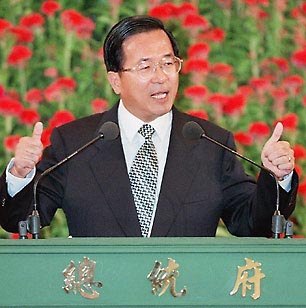Ma: Taiwan not to sacrifice sovereignty, defence to China
 Taipei - Taiwan President Ma Ying-jeou said Saturday that the island would never sacrifice its national sovereignty or defence in developing peaceful ties with China, once a bitter political rival.
Taipei - Taiwan President Ma Ying-jeou said Saturday that the island would never sacrifice its national sovereignty or defence in developing peaceful ties with China, once a bitter political rival.
The president, who has made mending ties with China a priority, also called on Beijing to remain patient and face up to practical realities to build mutual trust and find common ground for the sake of achieving cross-strait peace.
In his National Day Address, marking the 98th anniversary of the founding of the Republic of China, Taiwan's official name, Ma said cross-strait differences and concerns are rooted in historical factors that cannot be overcome all at once.
"To achieve further peaceful development of our relations, both sides must remain patient, face up to practical realities and move forward in a gradual, orderly manner so as to build mutual trust and find common ground amid our differences," he said.
Taiwan and China split at the end of a civil war in 1949. Beijing has vowed to bring the island back into its fold, if necessary by force, but cross-strait tensions have eased since China-friendly Ma became president in May last year and adopted a policy of engaging Beijing.
Ma's policy has resulted in warming cross-strait ties and nine agreements ranging from permission for Chinese tourists to visit Taiwan and direct air, sea and postal links to food safety inspections and cross-strait legal assistance. The island is also seeking to sign agreements on financial supervisory cooperation and trade agreement.
But that has led to worries by independence advocates in Taiwan that Ma is leaning too far toward China and might turn over the island to the mainland one day.
Ma said he was aware of such worries and was willing to engage in dialogue to forge a public consensus on China policy.
"Taiwan is a democratic society, and our foremost guiding principle in addressing cross-strait issues is to safeguard our national sovereignty and advance our people's welfare," he said.
He added that Taiwan has never overlooked the military threat posed by China, which has been undergoing a rapid military buildup and has deployed more than 1,300 missiles targeting the island.
"In pursuing cross-strait peace, we shall never sacrifice Taiwan's national security, and our insistence on the national defence strategy of effective deterrence and resolute defence remains firm," Ma said.
He said he "intends to energetically develop a professional military, based on recruitment of volunteers to form a compact yet powerful defensive force to protect the security of Taiwan."
But Ma also took note of the importance of engaging China, which, he said, not only helps ease cross-strait tensions and maintains regional stability but also allows him to promote his "flexible diplomacy" policy, so the two sides would be able to refrain from attempts to lure away the other's diplomatic allies.
Beijing and Taipei have spent billions of dollars in their diplomatic offensives, of which the island has come out the loser. Since Ma became president, the number of Taiwan's allies has remained unchanged at 23.
Taiwan cancelled its usual National Day celebration this year after a typhoon that hit in August killed more than 600 people and left thousands homeless. (dpa)